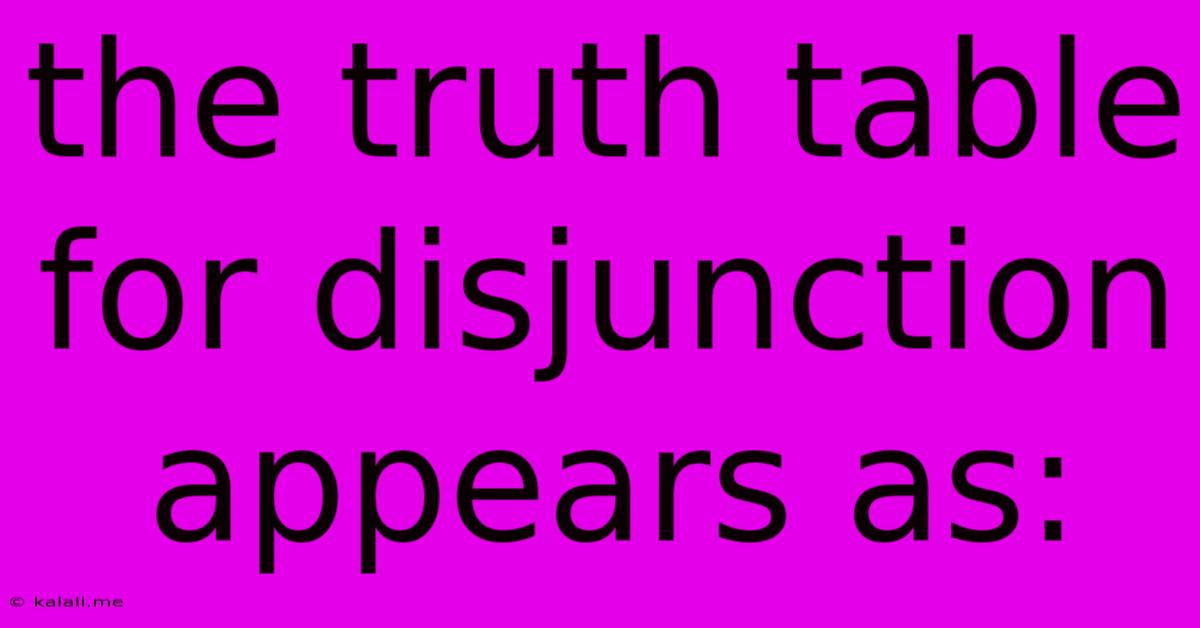The Truth Table For Disjunction Appears As:
Kalali
Jun 10, 2025 · 3 min read

Table of Contents
The Truth Table for Disjunction: A Comprehensive Guide
The truth table for disjunction, often represented by the symbol "∨" or the word "or," is a fundamental concept in logic and Boolean algebra. Understanding this table is crucial for anyone working with logic circuits, programming, or formal reasoning. This article will explore the truth table for disjunction in detail, explaining its construction and applications. It will also delve into the differences between inclusive and exclusive disjunction.
What is Disjunction?
Disjunction is a logical connective that combines two or more propositions (statements that can be either true or false) to form a compound proposition. The compound proposition is true if at least one of the constituent propositions is true. This is the key characteristic that defines disjunction. It's important to distinguish this from other logical connectives like conjunction ("and") and implication ("if...then").
The Truth Table
The truth table for disjunction systematically shows the truth value of the compound proposition for all possible combinations of truth values of its constituent propositions. Let's consider two propositions, p and q. The truth table would look like this:
| p | q | p ∨ q |
|---|---|---|
| True | True | True |
| True | False | True |
| False | True | True |
| False | False | False |
Understanding the Rows
- Row 1 (True, True): If both p and q are true, then their disjunction (p ∨ q) is also true.
- Row 2 (True, False): If p is true and q is false, the disjunction is still true because at least one of the propositions is true.
- Row 3 (False, True): Similarly, if p is false and q is true, the disjunction is true.
- Row 4 (False, False): Only when both p and q are false is their disjunction also false. This is the only scenario where the disjunction is false.
Inclusive vs. Exclusive Disjunction
The above truth table represents inclusive disjunction. This means the disjunction is true if at least one of the propositions is true, including the case where both are true. There's also exclusive disjunction, sometimes written as "XOR" (exclusive or), which is true only if exactly one of the propositions is true. Its truth table is different:
| p | q | p XOR q |
|---|---|---|
| True | True | False |
| True | False | True |
| False | True | True |
| False | False | False |
Notice the difference in the first row. In inclusive disjunction, (True, True) results in True, while in exclusive disjunction, it results in False.
Applications of Disjunction
Disjunction is a fundamental building block in many areas:
- Logic Circuits: Used to design logic gates that produce an output based on the disjunction of their inputs.
- Programming: Conditional statements frequently use "or" operations (represented differently in various programming languages but based on the same logic) to control program flow.
- Formal Reasoning: Essential in constructing arguments and proofs in mathematical logic and computer science.
- Database Queries: Used in SQL and other database languages to combine search criteria (e.g., find records where condition A or condition B is true).
Conclusion
The truth table for disjunction provides a clear and concise way to understand the behavior of this crucial logical connective. Its simplicity belies its importance in various fields, highlighting the fundamental role of logic in computation and reasoning. Understanding the distinction between inclusive and exclusive disjunction is also vital for accurate application of logical principles. Remember to always consider the context to determine whether inclusive or exclusive "or" is being used.
Latest Posts
Latest Posts
-
University Of Hong Kong Acceptance Rate
Jun 12, 2025
-
Excel Test Questions And Answers Pdf
Jun 12, 2025
-
Which One Of The Following Statements Is Not True
Jun 12, 2025
-
Which Statement Is Not True About Bacteria
Jun 12, 2025
-
Words With O I In Them
Jun 12, 2025
Related Post
Thank you for visiting our website which covers about The Truth Table For Disjunction Appears As: . We hope the information provided has been useful to you. Feel free to contact us if you have any questions or need further assistance. See you next time and don't miss to bookmark.